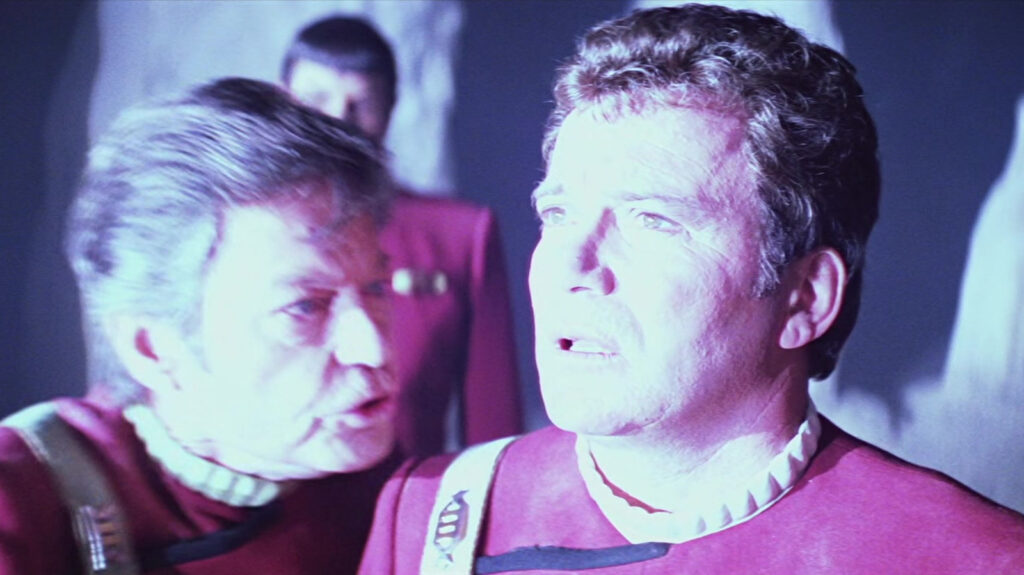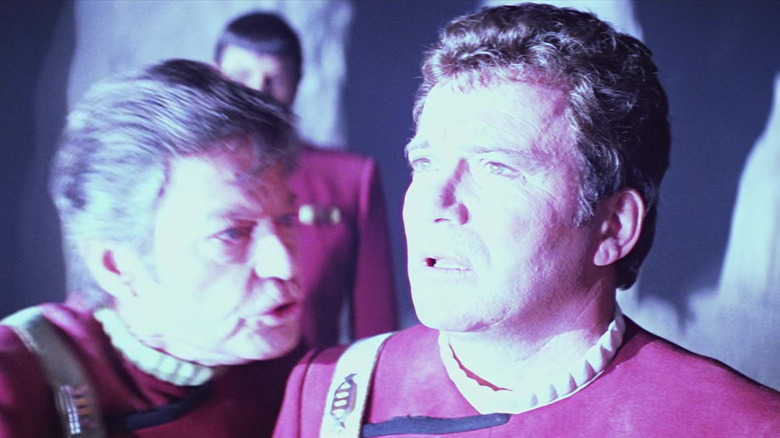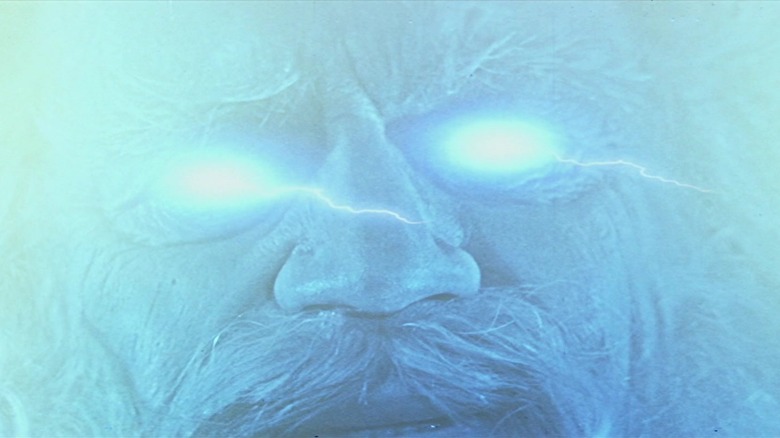The Remaining Frontier Failed For One Purpose

Going again to 1966, “Star Trek” co-stars William Shatner and Leonard Nimoy had what was known as a “favored nations clause” of their contracts. The clause ensured that every time one actor bought a elevate, or maybe enter right into a script, the opposite one would get the identical. This was performed to consolation two actors who have been consistently butting heads as to who the actual “star” of “Star Trek” was. The favored nations clause made positive that neither actor might “pull forward” of the opposite.
The clauses have been nonetheless in place by the Nineteen Eighties, so when Nimoy was employed to direct “Star Trek III: The Seek for Spock” (1984) and “Star Trek IV: The Voyage Residence” (1986), Shatner was capable of pull rank. Due to a pay dispute on “Star Trek IV,” Shatner might contractually elbow his manner into the director’s chair for 1989’s “Star Trek V: The Remaining Frontier.” Not solely that, however Shatner was additionally allowed to dictate story concepts and write therapies; Shatner has a story-by credit score on “Frontier” as properly. Persistence, expensive reader, as we will describe the story in a second.
Many will hasten to level out that “The Remaining Frontier” is commonly thought-about the worst of the extant 13 “Star Trek” films. The script was clumsy, because it was consistently being re-written to placate the forged (the majority of the movie’s $33 million funds went to expertise). Furthermore, the 1988 writers’ strike reduce into pre-production and Paramount could not afford its ordinary staff of visible results wizards from Industrial Gentle & Magic, forcing the studio to rent a less expensive technician on the fly. Fixed funds cuts additionally made the movie look low cost. There have been myriad different manufacturing troubles apart from.
In keeping with a 1993 interview with Star Trek Explorer Journal, “Frontier” producer Harve Bennett blames each drawback instantly on Shatner (who had remaining story approval). Bennett felt that Shatner’s final choice to make a “Star Trek” movie about discovering the bodily location of God (!) was foolhardy. Shatner’s choices, Bennett argued, have been unhealthy from the beginning.
The story of Star Trek V
The story of “Star Trek V” is slightly unusual for the franchise. A hippie-like Vulcan cult chief named Sybok (Laurence Luckinbill) has the power to psychically attain into the minds of his followers, erase their ache, and switch them into loyal followers. Sybok phases an elaborate scheme to lure the united statesS. Enterprise to a sure planet the place he’ll have the ability to hijack it and take it on a private mission. Spock, we later be taught, is unable to face as much as Sybok as he’s Spock’s half-brother.
And what was Sybok’s private mission? It appears he discovered that the very middle of the Milky Means galaxy is the bodily dwelling of the one true God. He goals to sail to the galactic core (in actuality, a supermassive black gap) and converse to God in particular person. This contradicts “The Magicks of Megas-tu” (October 27, 1973), an episode of “Star Trek: The Animated Collection,” which depicted the Satan residing on the middle of the galaxy, however solely deep-cut Trekkies are bothered by that. “Star Trek V” climaxes with Kirk, Sybok, and a number of other others really assembly God, or not less than an alien claiming to be God.
To Bennett’s eyes, this was a poor story from the bounce. He was quoted as saying:
“I might say that ‘Star Trek V’ was the weakest of the photographs, each by way of coherency and its field workplace, and [what] I might say with out shirking accountability is that the issue was Invoice had story approval. […] He is aware of this, so I am not ratting on my pal, however mainly, we bought to some extent the place I mentioned, ‘Invoice, we can’t make a film about discovering God!’ I mentioned that from the start.”
Bennett additionally felt that there was no manner “Star Trek” would really introduce God as a personality, so the seek for the Divine, he felt, had an ending everybody might predict.
Kirk vs. God
Bennett was succinct:
“I do know that should you say in a TV logline, ‘Tonight on ‘Star Trek,’ the crew of the united statesS. Enterprise goes to seek out God,’ everyone is aware of we’re not going to go there. In order a storyteller, it will get to be a shaggy joke!”
It is value stating that “Star Trek” takes place in a post-religious, wholly secular world the place people not seem to worship or consider in a God being. Present creator Gene Roddenberry was overtly atheist and wished “Star Trek” to rid itself of any notions of God. “Star Trek V” did not begin with a nasty concept, thematically — a battle between two males with very totally different views of infinity — however the precise bodily search of God appeared foolish and overblown to Bennett.
The producer additionally recalled Shatner’s blood-minded insistence on the thought, although, stating he finally needed to wash his arms of your complete affair:
“He wished to do it, so after a lot aggravation, I mentioned, ‘All proper, we’ll go discover God, however we’ll make it one of the best journey we probably can!’ […] It was doomed by its premise. […] I discovered way back, if it ain’t within the premise, it ain’t there, however Invoice felt if we labored laborious sufficient and dazzled them with sufficient stuff, we might do it, and I do not suppose we pulled that off […] I feel a defective premise leads to a flawed image.”
The premise was flawed and, sadly, there wasn’t sufficient cash on the desk to dazzle audiences both. “Star Trek V” hasn’t undergone any kind of fan re-litigation since its launch in 1989, and it stays the worst of the “Star Trek” films. Was it Shatner’s fault? It is easy to level fingers in his path. To his credit score, Shatner has apologized.









